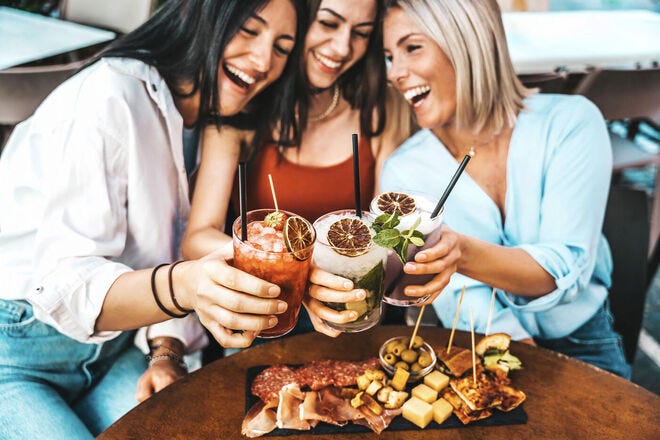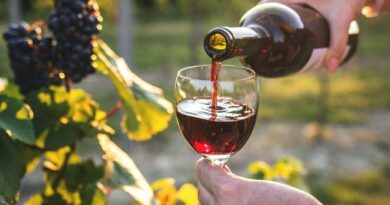What does sober curious mean? Everything you need to know
Non-alcoholic beverages are fueling the sober curious movement — Photo courtesy of Kar-Tr / iStock Via Getty Images
The notion of alcohol as a social lubricant has long been the norm — ask the designated driver at any event. However, in recent years, there’s been a growing awareness of the health implications of alcohol consumption and a cultural shift toward non-alcoholic beverages.
Low-alcohol and zero-proof beverage sales have grown 11% over the past five years. Much of this, experts say, is due to the sober curious movement. To help you better understand what it means, its benefits, and how to begin cutting back on your alcohol consumption, we’ve rounded up the answers to some key questions about being sober curious.
What does sober curious mean?
Being sober curious means different things to different people. It’s not cutting out alcohol entirely, but more about exploring your relationship with alcohol and how to drink less of it. Maybe it’s cutting out regular happy hour cocktails with friends, not drinking wine or beer for a week, or jumping on the Dry January trend and forgoing alcohol for a whole month.
“The sober curious movement challenges societal norms surrounding drinking,” explains Dr. Amy Myers, who specializes in functional medicine and gut health. “It allows people to question the role alcohol plays in their life, becoming more mindful of their drinking habits. This movement is a natural extension as health, wellness, and mindfulness are becoming mainstream among the Gen Z generation.”
What are the benefits of cutting back on alcohol?
While some studies suggest that a glass of red wine can be beneficial for cardiovascular health, experts widely agree that overconsumption of alcohol presents a problem. Reducing alcohol consumption comes with a bevy of positive side effects, ranging from improved mood, energy, and mental clarity to better sleep, digestion, skin, nutrient absorption, and protection of your internal organs.
“Research has shown that cutting back on alcohol consumption leads to improvements in concentration and sleep patterns, reduced cholesterol, lower glucose levels, lower blood pressure, and overall weight loss,” says Myers, noting that alcohol also feeds candida and small intestine bacterial overgrowth, so cutting back on it will improve gut health.
There are also potential interpersonal benefits to reducing your alcohol consumption. “After reducing your alcohol intake, mentally you may feel more intentional, more present, and more connected to those around you,” says John Herman, co-founder of non-alcoholic beer brand BERO.
The sober curious movement
 Being sober curious doesn’t mean you can’t hang out with your friends — Photo courtesy of skynesher / E+
Being sober curious doesn’t mean you can’t hang out with your friends — Photo courtesy of skynesher / E+
Being sober curious isn’t just a social media trend; it’s a movement. This could be a generational shift — Gen Z is particularly interested in a more health-conscious lifestyle than previous generations — or just that there are more choices now.
“As people become more aware of the negative impacts alcohol can have on their health, wallets, and overall wellbeing, they’re starting to wonder what it might be like to live a life without it,” says Claire Chewning, a registered dietician with Yours Chewly Nutrition. “There has also been a rise in non-alcoholic beverages like kombucha and prebiotic sodas hitting the shelves in recent years, which may help people realize that drinks don’t have to include alcohol to be enjoyable.”
Health & Wellness: Sober vacations can be fun AF (alcohol-free) with these travel companies
Living a low-alcohol or no-alcohol lifestyle is also more widely accepted among peers today. “It’s no longer ‘weird’ or stigmatized to say you’re not drinking at a party or dinner,” says Morgan McLachlan, co-founder of De Soi. “But with the availability of sophisticated non-alcoholic alternatives, people can participate fully in social rituals while making choices that feel good for them.”
Given the social aspect of drinking, it might be challenging to break away from alcohol in group settings, but there are things you can do to ease the burden. Not giving in to peer pressure is one.
“Create reasonable expectations,” says Myers. “Set your expectations for just you and let go of what you can’t control, whether that’s people’s perception of you, extenuating circumstances, or emergencies.”
How to be sober curious
 Low-alcohol and zero-proof beverage options make it easier to be sober curious — Photo courtesy of Cook Shoots Food / iStock Via Getty Images
Low-alcohol and zero-proof beverage options make it easier to be sober curious — Photo courtesy of Cook Shoots Food / iStock Via Getty Images
Sober curiosity can be a unique experience involving trying new things and stepping outside your comfort zone. Here are a few ways to shift your mindset and get started.
Books that explore the sober curious movement
If you’re interested in the book that started it all, check out “Sober Curious” by Ruby Warrington, who spearheaded the movement to reevaluate our relationship with alcohol.
McLachlan recommends several resources, including “Quit Like a Woman” by Holly Whitaker and “This Naked Mind” by Annie Grace. “They both do an amazing job of reframing how we think about alcohol in our lives,” she says.
Chewning also recommends “Not Drinking Tonight,” by Amanda E. White, which again helps to reframe our connection to and potential dependence on alcohol. “Sober Lush,” by Amanda Eyre Ward and Jardine Libaire, is another excellent read that offers ways to live “a decadent, adventurous, soulful life — alcohol-free.”
Low-alcohol or non-alcoholic drinks
There are many non-alcholic beers, wines, and spirits to replace (or temporarily substitute) your favorite boozy beverages. You can try functional beverages (like kombucha) or drinks that maintain the same bespoke feeling as a cocktail without (or with less) alcohol.
De Soi, a non-alcoholic aperitif, can be enjoyed on its own or mixed with alcohol. You could also check out non-alcoholic or low-ABV beers like BERO, Partake, and Athletic Brewing.
Who was voted the best?: Best Non-Alcoholic Wine (10Best Readers’ Choice Awards 2024)
Ultimately, exploring the sober curious movement is a personal journey. “When you discover that your personality and charisma are tied to you and not the ethanol in your drink, it can be an incredible realization that will help you decide what your journey looks like,” says Herman.




